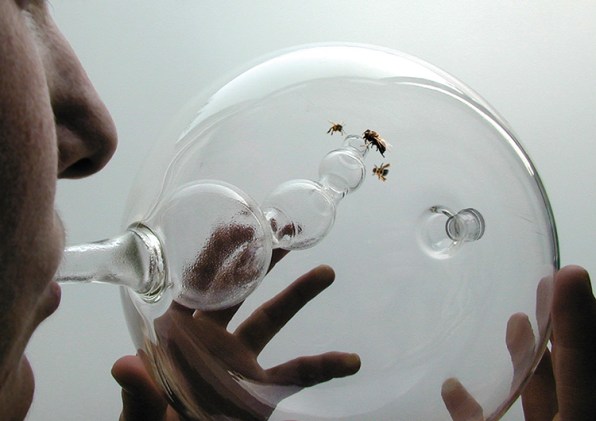How To Draw Queen Bee
Even when a honeybee is a couple of miles away, it can still smell a particular flower or toxin. A bee's olfactory sense is so acute–as much as 100 times more sensitive than a human's nose–that it can even sniff out the scent of a cancer tumor to help give early diagnoses. This is why London-based artist Susana Soares is now training bees to be doctors' assistants.
Bees, it turns out, can learn to recognize biomarkers of disease very quickly. "Bees can be trained in a few minutes," Soares says. Like dogs, they respond to rewards: Give them a sweet treat and associate that with a certain smell a few times, and they'll continue to fly toward the smell afterward.
For a diagnosis, it's as simple as getting a bee to sniff someone's breath to see if a specific compound is present. Soares worked with a glassblower to create a special glass globe with two chambers to help the bees do their analysis. A patient blows into a smaller part of the globe, while the bees wait inside a larger chamber. If the bees recognize a scent, they'll fly towards it.
The test is surprisingly accurate, thanks to the bees' ability to detect incredibly tiny concentrations of molecules in range of parts per trillion. "Research has demonstrated that bees can be trained to target the chemical compounds of tuberculosis, lung, skin, and pancreatic cancer as well as diabetes," Soares says.

Soares first became interested in the superpowers of bees as part of a larger project. "I was particularly interested in the use of biological systems that could increase human perceptive abilities," she says. "This aim of [this] project is to re-think how we might cohabit with natural systems. Those systems have always been there, but their potential was unknown."
For now, the devices aren't ready for commercial use. "These are very experimental prototypes and therefore would need a lot more testing," Soares explains. But she says there's interest in pursuing the project as a low-cost way to detect diseases at an early stage, especially in developing countries. It's something that could easily happen at larger scale, she says. "A large number of bees can be set up quickly," Soares says, "and target a range of compounds."
She envisions creating a "bee center" with a beehive, training facility, research lab, and health care center. After diagnosing a patient, bees would return to their hives.
On her website, Soares asks what would happen if bees became a regular diagnostic tool to screen for cancer. "Which one would we trust more, a machine or a biosensor?" she writes. "Could beetraining become a profession?"
How To Draw Queen Bee
Source: https://www.fastcompany.com/3022123/the-queen-will-see-you-now-how-bees-sense-of-smell-might-soon-diagnose-disease
Posted by: ungerherhumbrod.blogspot.com

0 Response to "How To Draw Queen Bee"
Post a Comment